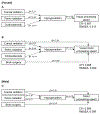Hypogonadism and neurocognitive outcomes among childhood cancer survivors
- PMID: 38468563
- PMCID: PMC11052539
- DOI: 10.1093/ejendo/lvae027
Hypogonadism and neurocognitive outcomes among childhood cancer survivors
Abstract
Objective: Childhood cancer survivors are at risk for hypogonadism. The impact of hypogonadism on neurocognitive impairment and emotional distress in the non-cancer population has been shown; however, the relationship among the childhood cancer survivor population is unknown. We aimed to evaluate the contribution of hypogonadism to neurocognitive impairment and emotional distress among survivors.
Design: Cross-sectional study using retrospective cohort.
Methods: In total, 3628 survivors who completed standard neurocognitive tests (six domains: processing speed, memory, executive function, attention, academics, and global cognition) and self-reported emotional distress were included in our study. Participants were stratified by sex and gonadal status. Outcomes were compared between hypogonadal and eugonadal groups by multivariable analysis, adjusting for established predictors, and mediation analyses to determine the direct/indirect effects of hypogonadism on outcomes.
Results: The hypogonadal group exhibited a higher prevalence of neurocognitive impairment across domains, but no difference in emotional distress. Hypogonadal females exhibited higher relative risk (1.7, 95% CI, 1.2-2.5) for impaired visual processing speed, compared to eugonadal females after adjusting for cancer-related variables. In mediation models, hypogonadism had a significant direct (P < .01) and indirect (from P < .01) impact on impairment in visual processing speed among females. Males demonstrated direct (P = .03) and indirect (P = .04) impact of hypogonadism on motor processing speed.
Conclusion: Processing speed may be the most vulnerable neurocognitive domain associated with hypogonadism in survivors, while other domains were mainly impacted by cancer-related variables. Our findings support the need for further evaluation of the impact of sex hormone replacement therapy on neurocognitive function.
Keywords: childhood cancer survivors; hormone replacement therapy; hypogonadism; neurocognitive dysfunction; sex hormone.
© The Author(s) 2024. Published by Oxford University Press on behalf of European Society of Endocrinology. All rights reserved. For commercial re-use, please contact reprints@oup.com for reprints and translation rights for reprints. All other permissions can be obtained through our RightsLink service via the Permissions link on the article page on our site—for further information please contact journals.permissions@oup.com.
Conflict of interest statement
Conflict of interest: None of the authors have any conflicts of interest.
Figures


References
-
- Chemaitilly W, Li Z, Krasin MJ, Brooke RJ, Wilson CL, Green DM, Klosky JL, Barnes N, Clark KL, Farr JB, Fernandez-Pineda I, Bishop MW, Metzger M, Pui CH, Kaste SC, Ness KK, Srivastava DK, Robison LL, Hudson MM, Yasui Y & Sklar CA. Premature Ovarian Insufficiency in Childhood Cancer Survivors: A Report From the St. Jude Lifetime Cohort. J Clin Endocrinol Metab 2017. 102 2242–2250. - PMC - PubMed
-
- Chemaitilly W, Liu Q, van Iersel L, Ness KK, Li Z, Wilson CL, Brinkman TM, Klosky JL, Barnes N, Clark KL, Howell RM, Smith SA, Krasin MJ, Metzger ML, Armstrong GT, Bishop MW, van Santen HM, Pui CH, Srivastava DK, Yasui Y, Hudson MM, Robison LL, Green DM & Sklar CA. Leydig Cell Function in Male Survivors of Childhood Cancer: A Report From the St Jude Lifetime Cohort Study. J Clin Oncol 2019. 37 3018–3031. - PMC - PubMed
-
- van Iersel L, Li Z, Srivastava DK, Brinkman TM, Bjornard KL, Wilson CL, Green DM, Merchant TE, Pui CH, Howell RM, Smith SA, Armstrong GT, Hudson MM, Robison LL, Ness KK, Gajjar A, Krull KR, Sklar CA, van Santen HM & Chemaitilly W. Hypothalamic-Pituitary Disorders in Childhood Cancer Survivors: Prevalence, Risk Factors and Long-Term Health Outcomes. J Clin Endocrinol Metab 2019. 104 6101–6115. - PMC - PubMed
MeSH terms
Grants and funding
LinkOut - more resources
Full Text Sources
Medical

